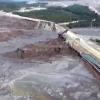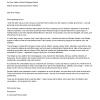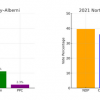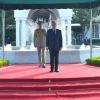National Security Council
The White House
1600 Pennsylvania Avenue
Washington, DC 20500
September 10, 2014
To the distinguished staff at the National Security Council,
As President Barack Obama and the National Security Council team have stated unequivocally over the past week, the Islamic State of Iraq and the Levant (ISIL) is one of the most dangerous national security threats that the United States faces in the world today. The organization's penchant for absolute and undiscriminating brutality against civilians -- men, women and children alike -- is a shock to the conscience of the world in the 21st Century. Only the United States, with its military capability, dedicated intelligence professionals, diplomatic prowess, and leadership qualities, can best degrade and ultimately defeat the threat that ISIL poses.
To this end, I applaud the NSC's dedication over the past week in reaching out to our friends, allies, and partners in the Arab world in order ensure that all nations with a stake in the region's stability are participating in lockstep with the United States. Saudi Arabia, Jordan, Turkey, the United Arab Emirates, and Iraq all have an ability to contribute the manpower, intelligence capability, and funding that will be required to resist the territorial gains that ISIL has made over the past two months. The goal, as the president has said, is to defeat the organization's ability to inflict harm on innocents and its capacity to execute terrorist attacks on American citizens and American interests. The establishment of a core group of countries willing to assist the United States in this objective, including America's principle European allies Great Britain, France, and Germany, will send a powerful message to ISIL's leadership and foot-soldiers that the entire world -- not just the U.S. -- views its activity as abhorrent and incompatible with even the most basic of human rights.
There has been a rash of commentary from conservative magazines, newspapers, editorial boards, and Republicans on Capitol Hill questioning whether the president and his administration have a clear-cut plan for degrading and defeating ISIL. Speaker Boehner, Minority Leader McConnell, and key Republican lawmakers on the Senate and House foreign relations and armed services committees have consistently argued that the White House is reacting to the ISIL scourge too slowly and is still finalizing a strategy before presenting it to the Congress and the American people. Yet, just as the president exhibited caution and patience during the Afghanistan policy war review in the fall of 2009, it is equally important that President Obama and his national security team think through all of the alternatives -- including what the long-term objective is, what action will be needed to accomplish it, how long this action will take, and what the consequences or repercussions may be.
Appealing to our Arab allies in the region is critical if we are to have any success in checking ISIL's expansion and eventually shrinking its area of operations. U.S. air strikes on ISIL bases and facilities in Iraq and Syria will certainly help in the short-term, as has been demonstrated near Erbil, Sinjar mountain, and the Mosul Dam. But in order to fully capitalize on the technological capabilities that the U.S. possesses, we must partner with forces on the ground that are willing to fight back against ISIL militants.
I therefore encourage the administration to quickly expedite the $500 million in assistance to the moderate Syrian opposition as soon as Congress approves the package. Just as the Department of Defense has partnered with the Iraqi Government and the Kurdish peshmerga to great affect so far, the U.S. must follow the same path in Syria. Allying with Bashar al-Assad's regime, even indirectly, should not be an option. Therefore, if Congress delays action on the your proposed $500 million spending package for a large-scale train and equip mission for the moderate elements of the Syrian opposition, the White House should sincerely think about expanding what has thus far been a small-sized covert mission in Jordan. Without strengthening the moderate Syrians on the ground and building their capacity to take advantage of U.S. air strikes, clearing Syria from ISIL will be virtually impossible.
As an American citizen who one day hopes to become a public servant and who frequently monitors our nation's foreign policy, I continue to wish you and your colleagues in the State Department, Pentagon, and intelligence community the best of luck. America's security depends on the efforts that you make in the weeks ahead.
With respect,
Daniel R. DePetris
















